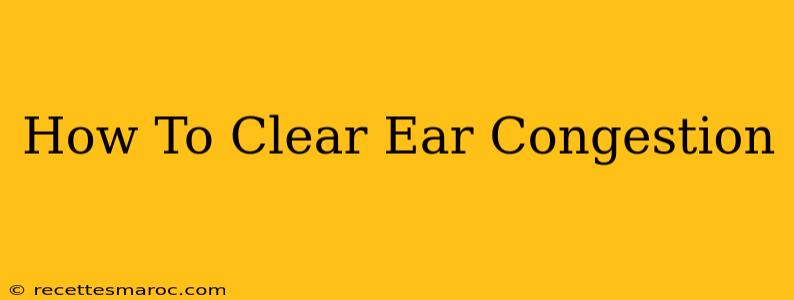Ear congestion, that uncomfortable feeling of fullness or pressure in your ears, can be incredibly bothersome. It can stem from a variety of causes, including allergies, colds, changes in altitude, or even excess earwax. Fortunately, there are several safe and effective ways to alleviate ear congestion at home. This guide will walk you through various methods, helping you find relief quickly and naturally.
Understanding Ear Congestion
Before diving into solutions, it's crucial to understand why your ears might feel congested. Common culprits include:
- Allergies: Seasonal allergies or reactions to irritants can cause inflammation and fluid buildup in the Eustachian tubes, leading to congestion.
- Colds and Flu: Viral infections often affect the ears, causing inflammation and mucus production that blocks the Eustachian tubes.
- Sinus Infections: Infections in the sinuses can spread to the ears, resulting in similar symptoms.
- Altitude Changes: Rapid changes in altitude, such as during air travel, can create pressure imbalances in the ears.
- Excess Earwax: A buildup of earwax can physically block the ear canal and cause a feeling of fullness.
- Water in the Ear: Trapped water after swimming can also lead to a sense of congestion.
Important Note: While these home remedies can provide relief for mild ear congestion, persistent or severe ear pain, fever, hearing loss, or dizziness require immediate medical attention. These could be signs of a more serious underlying condition.
Home Remedies for Ear Congestion
Here are some simple, home-based remedies that can help clear ear congestion:
1. The Valsalva Maneuver
This technique helps equalize pressure in the middle ear. To perform the Valsalva maneuver:
- Gently pinch your nostrils closed.
- Close your mouth.
- Try to exhale gently, as if you were blowing your nose. You should feel a slight popping sensation in your ears as the pressure equalizes.
- Important: Do this gently; forceful exhaling can be harmful.
2. Yawning
Yawning naturally equalizes pressure in the ears. Try to yawn widely and deeply to relieve congestion.
3. Swallowing
Swallowing also helps to open the Eustachian tubes. Try chewing gum or sucking on hard candies to stimulate swallowing.
4. Warm Compress
Applying a warm compress to the affected ear can help reduce inflammation and alleviate discomfort. Simply soak a clean cloth in warm water, wring it out, and apply it to your ear for 10-15 minutes.
5. Saline Nasal Spray or Rinse
Clearing congestion in your nasal passages can often alleviate ear congestion as well. A saline nasal spray or rinse can help to thin and clear mucus, improving drainage.
6. Over-the-Counter Medications
Over-the-counter pain relievers like ibuprofen or acetaminophen can help reduce pain and inflammation associated with ear congestion. Always follow the dosage instructions on the package. Decongestants may also provide temporary relief, but prolonged use should be avoided.
7. Elevating Your Head
Elevating your head while sleeping can improve drainage and reduce pressure in the ears. Use extra pillows to keep your head elevated.
When to See a Doctor
While home remedies often provide relief, it's crucial to seek professional medical help if you experience:
- Severe ear pain
- High fever
- Hearing loss
- Dizziness or vertigo
- Drainage from the ear
- Symptoms lasting longer than a week
By understanding the causes of ear congestion and employing these simple remedies, you can often find quick and effective relief. Remember to always prioritize your health and consult a doctor if your symptoms worsen or persist.

